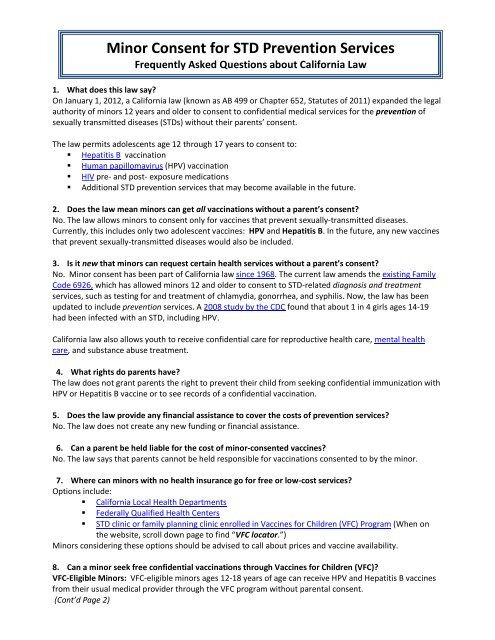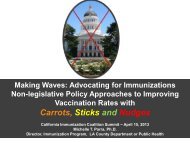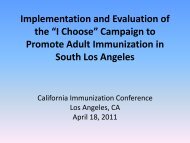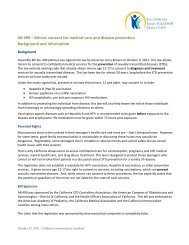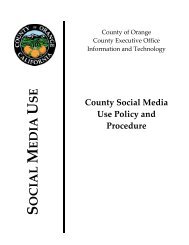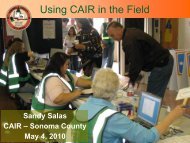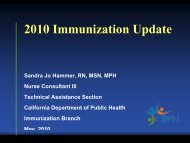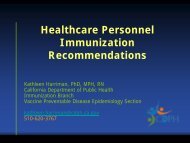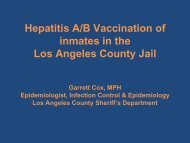Minor Consent for STD Prevention Services - California ...
Minor Consent for STD Prevention Services - California ...
Minor Consent for STD Prevention Services - California ...
Create successful ePaper yourself
Turn your PDF publications into a flip-book with our unique Google optimized e-Paper software.
<strong>Minor</strong> <strong>Consent</strong> <strong>for</strong> <strong>STD</strong> <strong>Prevention</strong> <strong>Services</strong><br />
Frequently Asked Questions about Cali<strong>for</strong>nia Law<br />
1. What does this law say?<br />
On January 1, 2012, a Cali<strong>for</strong>nia law (known as AB 499 or Chapter 652, Statutes of 2011) expanded the legal<br />
authority of minors 12 years and older to consent to confidential medical services <strong>for</strong> the prevention of<br />
sexually transmitted diseases (<strong>STD</strong>s) without their parents’ consent.<br />
The law permits adolescents age 12 through 17 years to consent to:<br />
• Hepatitis B vaccination<br />
• Human papillomavirus (HPV) vaccination<br />
• HIV pre- and post- exposure medications<br />
• Additional <strong>STD</strong> prevention services that may become available in the future.<br />
2. Does the law mean minors can get all vaccinations without a parent’s consent?<br />
No. The law allows minors to consent only <strong>for</strong> vaccines that prevent sexually-transmitted diseases.<br />
Currently, this includes only two adolescent vaccines: HPV and Hepatitis B. In the future, any new vaccines<br />
that prevent sexually-transmitted diseases would also be included.<br />
3. Is it new that minors can request certain health services without a parent’s consent?<br />
No. <strong>Minor</strong> consent has been part of Cali<strong>for</strong>nia law since 1968. The current law amends the existing Family<br />
Code 6926, which has allowed minors 12 and older to consent to <strong>STD</strong>-related diagnosis and treatment<br />
services, such as testing <strong>for</strong> and treatment of chlamydia, gonorrhea, and syphilis. Now, the law has been<br />
updated to include prevention services. A 2008 study by the CDC found that about 1 in 4 girls ages 14-19<br />
had been infected with an <strong>STD</strong>, including HPV.<br />
Cali<strong>for</strong>nia law also allows youth to receive confidential care <strong>for</strong> reproductive health care, mental health<br />
care, and substance abuse treatment.<br />
4. What rights do parents have?<br />
The law does not grant parents the right to prevent their child from seeking confidential immunization with<br />
HPV or Hepatitis B vaccine or to see records of a confidential vaccination.<br />
5. Does the law provide any financial assistance to cover the costs of prevention services?<br />
No. The law does not create any new funding or financial assistance.<br />
6. Can a parent be held liable <strong>for</strong> the cost of minor-consented vaccines?<br />
No. The law says that parents cannot be held responsible <strong>for</strong> vaccinations consented to by the minor.<br />
7. Where can minors with no health insurance go <strong>for</strong> free or low-cost services?<br />
Options include:<br />
• Cali<strong>for</strong>nia Local Health Departments<br />
• Federally Qualified Health Centers<br />
• <strong>STD</strong> clinic or family planning clinic enrolled in Vaccines <strong>for</strong> Children (VFC) Program (When on<br />
the website, scroll down page to find “VFC locator.”)<br />
<strong>Minor</strong>s considering these options should be advised to call about prices and vaccine availability.<br />
8. Can a minor seek free confidential vaccinations through Vaccines <strong>for</strong> Children (VFC)?<br />
VFC-Eligible <strong>Minor</strong>s: VFC-eligible minors ages 12-18 years of age can receive HPV and Hepatitis B vaccines<br />
from their usual medical provider through the VFC program without parental consent.<br />
(Cont’d Page 2)
Privately Insured <strong>Minor</strong>s: VFC-enrolled family-planning or <strong>STD</strong> clinics may provide VFC vaccine to privately<br />
insured minors ages 12-18 years of age who are seeking these vaccines without parental consent. Because<br />
these unaccompanied minors cannot access their insurance at the clinic, they are considered to be<br />
uninsured <strong>for</strong> VFC purposes and can receive these two vaccines under the VFC Program. However, as a<br />
“specialized VFC-eligible group," this group is subject to additional VFC Program screening, vaccination<br />
documentation, and ordering requirements. See the CDC’s guidance on reporting requirements by clinics<br />
<strong>for</strong> confidential immunizations given to unaccompanied minors.<br />
9. How does my clinic sign up <strong>for</strong> VFC?<br />
Providers can enroll by contacting VFC. Learn more at www.EZIZ.org or by calling 1-877-243-8832.<br />
10. Can a minor seek HPV and Hepatitis B vaccinations at a pharmacy?<br />
Many but not all pharmacies provide HPV and Hepatitis B vaccines, typically <strong>for</strong> a fee. Vaccines can be<br />
expensive, so minors considering this option should be advised to call the pharmacy about prices and<br />
vaccine availability.<br />
11. Do I need to show an unaccompanied minor a VIS be<strong>for</strong>e administering vaccinations?<br />
Yes. The National Childhood Vaccine Injury Act requires providers to share the Vaccine In<strong>for</strong>mation<br />
Statement (VIS) be<strong>for</strong>e administering each vaccination (not just with the first dose). Check the VIS edition<br />
date (on the back bottom corner) to make sure you are using the current version (available at<br />
www.cdc.gov/vaccines/pubs/vis/default.htm.) As the language in the VIS can be technical, it is also<br />
advisable to make sure the patient understands the benefits and risks of the vaccine.<br />
Record this required in<strong>for</strong>mation in the patient's medical record or a permanent office log:<br />
• date the VIS is provided<br />
• date the vaccine is administered<br />
• name, office address, and title of the person who administers the vaccine<br />
• vaccine manufacturer and lot number.<br />
12. How and where are confidential immunization services entered in a patient’s record?<br />
Providers should refer to their standard confidentiality protocols <strong>for</strong> written or electronic records.<br />
13. Can the Cali<strong>for</strong>nia Immunization Registry (CAIR) currently distinguish confidential from nonconfidential<br />
immunizations?<br />
Not at this time.<br />
14. Must a vaccinating clinic disclose confidential services to the patient’s primary care provider (PCP)?<br />
No. However, it is recommended that providers encourage minor patients to share their immunization<br />
history with their PCP to avoid inadvertently repeating confidential vaccinations.<br />
15. If a minor later decides to disclose the confidential in<strong>for</strong>mation to a parent or guardian, what followup<br />
is needed in the patient’s record?<br />
Use standard procedures to document the immunization in the patient’s non-confidential medical record.<br />
16. What are strategies to remind the patient about additional confidential doses in a multi-dose<br />
vaccine series?<br />
Determine with the minor the appropriate contact in<strong>for</strong>mation <strong>for</strong> follow-up communications, such as<br />
scheduling and reminders. Scheduling the next follow-up appointment while the patient is at the clinic may<br />
be helpful.<br />
CA Law on <strong>Minor</strong> <strong>Consent</strong> <strong>for</strong> <strong>STD</strong> <strong>Prevention</strong> <strong>Services</strong> FAQ, Jan. 2013 Page 2


